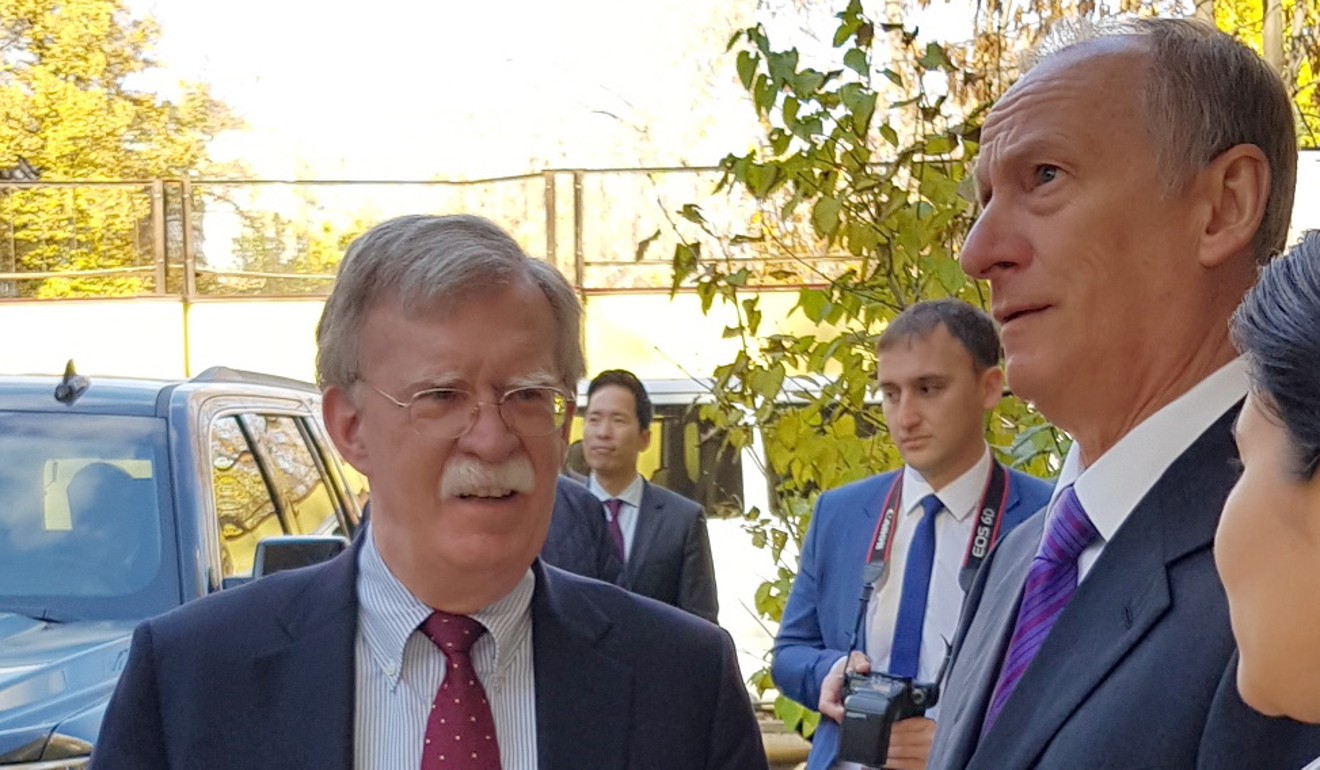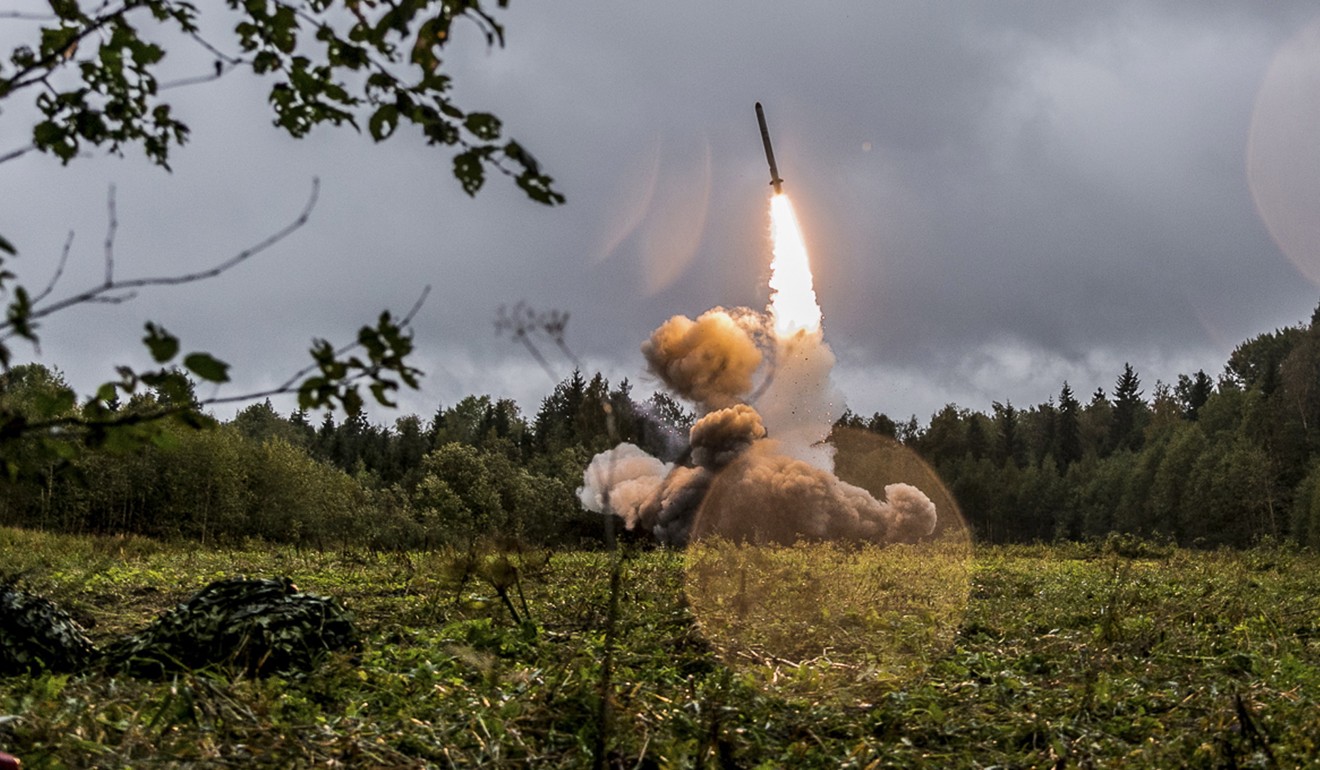
Russia tells US security chief Bolton it wants to cooperate on nuclear treaty, but Trump’s withdrawal puts world in peril
- US National Security Adviser John Bolton is in Moscow to discuss Trump’s plan to ditch the 31-year-old Intermediate-Range Nuclear Forces Treaty
- Separately, Trump warned on Monday that the United States intended to build up its arsenal of nuclear weapons to pressure Russia and China
The world could be in danger if the US abandons a cold-war-era nuclear treaty with Russia, top Kremlin officials warned President Donald Trump’s national security adviser on Monday.
National Security Adviser John Bolton is expected to discuss Trump’s plan to jettison the three-decade-old Intermediate-Range Nuclear Forces Treaty (INF) with Russian President Vladimir Putin on Tuesday.
Separately, Trump warned on Monday that the United States intended to build up its arsenal of nuclear weapons to pressure Russia and China.
Speaking to reporters, Trump repeated his contention that Russia was not abiding by the 1987 Intermediate-Range Nuclear Forces Treaty, which he has threatened to abandon.

Bolton talked bout the fate of the treaty with Foreign Minister Sergei Lavrov and also spent “nearly five hours” in talks with Russian Security Council chief Nikolai Patrushev, a spokesman said.
The collapse of the treaty would deal a “serious blow to the entire international legal system of non-proliferation and arms control,” the Security Council said in a statement after Patrushev and Bolton met.
The Russian Security Council stressed the meeting’s “constructive and business-like manner” and said Moscow is ready to work together with the United State to salvage the agreement.
We, as victims of aggression, as martyrs, will go to Heaven. They will simply die because they won’t even have time to repent
Patrushev and Bolton also discussed issues related to a possible extension by five years of the New START arms control treaty, which expires in 2021.
Later on Monday Lavrov and Bolton met for a “working dinner”, a Russian foreign ministry spokeswoman said.
Russia’s top diplomat said ahead of the meeting that he was waiting to hear Bolton’s “official explanation” regarding Trump’s intentions, adding that the US had not yet initiated the procedure for exiting the treaty.
Putin’s spokesman Dmitry Peskov told journalists that ditching the treaty “will make the world more dangerous” and rejected US claims that Moscow has violated the pact, instead accusing Washington of doing so.
Trump on Saturday claimed that Russia had long violated the treaty.
Donald Trump ‘targets’ China by pulling out of missile deal with Russia
“Russia has violated the agreement. They’ve been violating it for many years,” he said. “And we’re not going to let them violate a nuclear agreement and go out and do weapons [while] we’re not allowed to.”
Analysts have warned that the latest rift could have lamentable consequences and drag Russia into a new arms race.
Putin last week raised eyebrows by saying that Russians would “go to heaven” in the event of nuclear war and that Moscow would not use nuclear weapons first.
“The aggressor will have to understand that retaliation is inevitable, that it will be destroyed and that we, as victims of aggression, as martyrs, will go to Heaven,” he said. “They will simply die because they won’t even have time to repent.”

Trump’s announcement has raised global concerns, with the European Commission urging the US and Russia to pursue talks to preserve the treaty and China calling on Washington to “think twice”.
The Commission, the 28-nation European Union executive, stressed that the INF has been a mainstay of European defence for the last three decades.
“The US and the Russian Federation need to remain in a constructive dialogue to preserve this treaty and ensure it is fully and verifiably implemented,” spokeswoman Maja Kocijancic told reporters.
Chinese foreign ministry spokeswoman Hua Chunying said a unilateral withdrawal from the treaty “will have a multitude of negative effects”.
Russia ready to respond in kind if US develops intermediate missiles
Trump argued that the treaty does nothing to hold non-signatory China back from developing missiles, but Hua said that “it is completely wrong to bring up China when talking about withdrawal from the treaty”.
The treaty banning intermediate-range nuclear and conventional missiles was signed in 1987 by then US president Ronald Reagan and Mikhail Gorbachev, the last Soviet leader.
Watch: What does Vladimir Putin fear?
The latest row between Russia and the United States comes ahead of an expected second summit between Trump and Putin this year.
The Trump administration has complained of Moscow’s deployment of Novator 9M729 missiles, which Washington says fall under the treaty’s ban on missiles that can travel distances of between 500 and 5,500 kilometres.
US-Russia ties are under deep strain over accusations Moscow meddled in the 2016 US presidential election. The two countries are also at odds over Russian support for the Syrian government in the country’s civil war, and the conflict in Ukraine.
Putin and Trump will both be in Paris on November 11 to attend commemorations marking 100 years since the end of first world war.
Additional reporting by Reuters

.png?itok=arIb17P0)